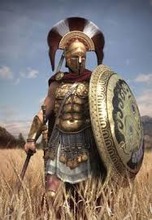American Civil War Battles
-
Smitty-48
- Posts: 36399
- Joined: Wed Nov 30, 2016 3:22 am
Re: American Civil War Battles
Information Warfare Fighter; strategically; American intellectual property dominance, tactically; denies information to the adversary while gathering exponentially information about, radically different from 20th century air combat.
Nec Aspera Terrent
-
Smitty-48
- Posts: 36399
- Joined: Wed Nov 30, 2016 3:22 am
Re: American Civil War Battles
4th Generation F-16; Flying Soldier.
5th Generation F-35; Flying Green Beret.
5th Generation F-35; Flying Green Beret.
Nec Aspera Terrent
-
Smitty-48
- Posts: 36399
- Joined: Wed Nov 30, 2016 3:22 am
Re: American Civil War Battles
In Civil War terms, going from F-16 to F-35 is like going from smoothbore breach loaded musket to minieball lever action rifle with telescopic sight.
Nec Aspera Terrent
-
brewster
- Posts: 1848
- Joined: Tue Dec 06, 2016 6:33 pm
Re: American Civil War Battles
It took a half century from the 1st steamboat for the Royal Navy to build a steam Ship of the Line, much like us now, Britain was a hegemonic power that wasn't challenged in open battle. Unlike wars from 1860 to 1945, we will not have the leisure to figure out where we got it wrong and redesign, we will not have the time to even resupply. How long would it take a GM plant to retool to make tanks? There's a drawbridge near me that is taking 10 years to build. We're not capable of moving fast anymore.
We are only accustomed to dealing with like twenty online personas at a time so when we only have about ten people some people have to be strawmanned in order to advance our same relative go nowhere nonsense positions. -TheReal_ND
-
Smitty-48
- Posts: 36399
- Joined: Wed Nov 30, 2016 3:22 am
Re: American Civil War Battles
Paralysis by analysis is not a solution, F-35 provides America & Co with Full Spectrum Dominance within the spectrum which congress directed, tactical interdiction, which is the bulk of what Air Combat Command does, with a parallel objective of dominating the combat aircraft market, to maintain America's edge which the taxpayer is paying for.
Nec Aspera Terrent
-
Smitty-48
- Posts: 36399
- Joined: Wed Nov 30, 2016 3:22 am
Re: American Civil War Battles
What are you comparing it to now? Gundams? X-Wing Fighter? Sharks with laser beams on their noses?
What Wunderwaffen to best F-35 is actually out there?
None.
What Wunderwaffen to best F-35 is actually out there?
None.
Nec Aspera Terrent
-
C-Mag

- Posts: 28399
- Joined: Tue Nov 29, 2016 10:48 pm
Re: American Civil War Battles
Tattooing in the Civil War Was a Hedge Against Anonymous Death
“Every regiment had its tattooers, with outfits of needles and India-ink,” Hinman wrote, “who for a consideration decorated the limbs and bodies of their comrades with flags, muskets, cannons, sabers and an infinite variety of patriotic emblems and warlike and grotesque devices.” Many a soldier, according to Hinman, had his name, regiment, and residence inked for identification. “It was like writing one’s own epitaph, but the custom prevented many bodies from being buried in ‘unknown’ graves,’” he wrote...........................
Tattoos have a long history as a means of identification in the military. In ancient Rome, mercenaries were marked with a permanent ink made from acacia bark, corroded bronze, and sulphuric acid to help in identifying deserters. Around the fourth century, the Roman military had a standard operating procedure for tattooing—a recruit would not be tattooed right away, but would “first be thoroughly tested in exercises so that it may be established whether he is truly fitted for so much effort,” the writer Vegetius noted. Even in the military, tattooing was a deliberate choice, not to be rushed into.
In the event of a soldier’s death, a tattoo could be a powerful tool for identification.
During the Battle of Hastings in 1066, the defending king, Harold II, was disfigured beyond recognition while fighting the invading Normans, led by William the Conqueror. Edith Swannesha, who spent her life as Harold’s companion and is sometimes called his common-law wife, was summoned to identify his body. She was only able to recognize him based on his tattoos—the words “Edith and England” across his chest.
https://www.atlasobscura.com/articles/civil-war-tattoos
“Every regiment had its tattooers, with outfits of needles and India-ink,” Hinman wrote, “who for a consideration decorated the limbs and bodies of their comrades with flags, muskets, cannons, sabers and an infinite variety of patriotic emblems and warlike and grotesque devices.” Many a soldier, according to Hinman, had his name, regiment, and residence inked for identification. “It was like writing one’s own epitaph, but the custom prevented many bodies from being buried in ‘unknown’ graves,’” he wrote...........................
Tattoos have a long history as a means of identification in the military. In ancient Rome, mercenaries were marked with a permanent ink made from acacia bark, corroded bronze, and sulphuric acid to help in identifying deserters. Around the fourth century, the Roman military had a standard operating procedure for tattooing—a recruit would not be tattooed right away, but would “first be thoroughly tested in exercises so that it may be established whether he is truly fitted for so much effort,” the writer Vegetius noted. Even in the military, tattooing was a deliberate choice, not to be rushed into.
In the event of a soldier’s death, a tattoo could be a powerful tool for identification.
During the Battle of Hastings in 1066, the defending king, Harold II, was disfigured beyond recognition while fighting the invading Normans, led by William the Conqueror. Edith Swannesha, who spent her life as Harold’s companion and is sometimes called his common-law wife, was summoned to identify his body. She was only able to recognize him based on his tattoos—the words “Edith and England” across his chest.
https://www.atlasobscura.com/articles/civil-war-tattoos
PLATA O PLOMO

Don't fear authority, Fear Obedience

Don't fear authority, Fear Obedience
-
Speaker to Animals

- Posts: 38685
- Joined: Wed Nov 30, 2016 5:59 pm
Re: American Civil War Battles
People had to do that in Iraq after Bush turned it into hell.
-
GloryofGreece

- Posts: 3007
- Joined: Fri Feb 17, 2017 8:29 am
Re: American Civil War Battles
Old Harold was a romantic. Or you all would call him a cuck.C-Mag wrote: Sat May 25, 2019 6:58 pm Tattooing in the Civil War Was a Hedge Against Anonymous Death
“Every regiment had its tattooers, with outfits of needles and India-ink,” Hinman wrote, “who for a consideration decorated the limbs and bodies of their comrades with flags, muskets, cannons, sabers and an infinite variety of patriotic emblems and warlike and grotesque devices.” Many a soldier, according to Hinman, had his name, regiment, and residence inked for identification. “It was like writing one’s own epitaph, but the custom prevented many bodies from being buried in ‘unknown’ graves,’” he wrote...........................
Tattoos have a long history as a means of identification in the military. In ancient Rome, mercenaries were marked with a permanent ink made from acacia bark, corroded bronze, and sulphuric acid to help in identifying deserters. Around the fourth century, the Roman military had a standard operating procedure for tattooing—a recruit would not be tattooed right away, but would “first be thoroughly tested in exercises so that it may be established whether he is truly fitted for so much effort,” the writer Vegetius noted. Even in the military, tattooing was a deliberate choice, not to be rushed into.
In the event of a soldier’s death, a tattoo could be a powerful tool for identification.
During the Battle of Hastings in 1066, the defending king, Harold II, was disfigured beyond recognition while fighting the invading Normans, led by William the Conqueror. Edith Swannesha, who spent her life as Harold’s companion and is sometimes called his common-law wife, was summoned to identify his body. She was only able to recognize him based on his tattoos—the words “Edith and England” across his chest.
https://www.atlasobscura.com/articles/civil-war-tattoos
The good, the true, & the beautiful
-
C-Mag

- Posts: 28399
- Joined: Tue Nov 29, 2016 10:48 pm
Re: American Civil War Battles
Canister Shot From Civil War Cannon
We fired 17 rounds of Canister from an original Civil War Napoleon Field Cannon for a study on battlefield archeology. Each Canister shell contained 27 steel balls 1.5" in dia that were painted a certain color and then fired out onto a field from various cannon positions. The cannon's coordinates and the balls that were found were all documented using GPS Technology. The cannon was fired at various barrel elevations and at different levels of terrain. The data when analyzed will hopefully help archeologists determine where the cannons may have been placed during a historic battle.
We fired 17 rounds of Canister from an original Civil War Napoleon Field Cannon for a study on battlefield archeology. Each Canister shell contained 27 steel balls 1.5" in dia that were painted a certain color and then fired out onto a field from various cannon positions. The cannon's coordinates and the balls that were found were all documented using GPS Technology. The cannon was fired at various barrel elevations and at different levels of terrain. The data when analyzed will hopefully help archeologists determine where the cannons may have been placed during a historic battle.
PLATA O PLOMO

Don't fear authority, Fear Obedience

Don't fear authority, Fear Obedience